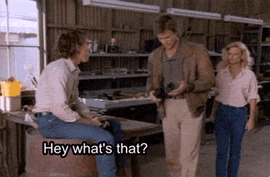In the last installment of this ongoing series (of which you can check out parts 1, 2, and 3 here, here, and here), things are going to go a bit different than before.

That’s because today we’re talking about one of the core elements of having players in your game: when they do things you don’t expect, and now you have to deal with them. Specifically, we’re looking at when they do something unexpected and get a notable die result – if we were to just look in general at players doing unexpected things, we’d be here until there’s a new edition of the game to talk about.
The thing is, I can’t exactly give you examples like I have been in the previous posts, because that would be something I’ve anticipated, and thus go against the very nature of what we’re looking at. So instead, I’m going to talk about some examples of things that have happened in games I’ve either run or played in. This does mean I’m bringing in games outside of 1879, but the broad concepts should be transferable. So gather round kiddies, it’s story time.

The first story is from a game of Earthdawn, with a group that were still fairly new to the game, but most of whom had previous experience with other games. One of the players was playing an Ork Swordmaster named Jorgen. He had made a character fairly fitting with his own personality; loud, party hard, drink to excess, but overall good natured. At this point, the group were passing through Kratas (which for those that don’t know is subtitled The City of Thieves), keeping to themselves (well most of the group anyway) because they were still around Second Circle and only there because they had to be, and trying very hard not to lose all their stuff. He was still getting used to the concept of Skills versus Talents, specifically in accumulating training hours for the latter, and while the rest of the group were turning in early for the night, he decided he was going to make use of the time and practice his Seduction Skill. A low level character who is a major blowhard practicing to pick up random strangers in The City of Thieves – oh yes, this had all kinds of opportunities to go wrong.
So he makes his first roll and gets a truly incredible result, I don’t recall exactly what but it was like in the 40’s. I proceed to tell him that he only gets in an hour of practice – he was at first upset that he got so little time, but when I explained it’s because he became “occupied”, as I put it, he was cool with that. I then tell him we’ll catch up with him in a little bit and went through the rest of the group’s nightly preparations. For the record, I knew what was going to happen to him at this point, but I wanted to introduce a pause here to keep him guessing. After we get through everyone else, I inform Jorgen that the next thing he knows, it’s the next day, or at least he thinks its the next day, and he wakes up on the floor of a strange room next to three other people that he has never seen before in his life. While he has most of his possessions, he can’t find his pants, nor do any of the pants in the room fit him. He finds a shirt he can wrap around himself, goes downstairs to find a barmaid to ask where he is. She laughs, gives him the ‘First time to Kratas?’ look, and asks him his name. He replies, “Jorgen.” She stops cold, turns back to him slowly and asks, “… Jorgen the Tickler?” To his out of character question, I confirm he has absolutely no idea. He shrugs and replies, “Umm…. yes?” She then drops the dishes she was holding to flail her hands yelling “EEEWWWW!” and runs out of the tavern.

Every so often after that when he went to a new place and introduced himself, someone would ask him about that title after hearing his name (and every single one of them had a different reaction to it). No, he never found out what happened that night or how that title came about. His player absolutely loved everything about it.
So, what can you take from this one? One, if your player is going to do something unexpected, even if it’s a bad idea, make sure they’re aware of the situation, but let them. Two, get to know your players and the type of game they’ll enjoy, and have a few ideas ready for situations like this. In this situation, I had come up with the basic idea of Jorgen picking up some sort of title he didn’t remember getting from a pub crawl at some point – I hadn’t expected it to be here, but with the roll that high, it was worth marking the occasion. If the roll had gone badly, he would have started a bar fight, and if it had gone mediocre, he would have just gotten some hours of practice in (and possibly a sore face from being slapped a few times), which is what he was looking to accomplish in the first place. Three, not all rewards for good rolls need to be directly material to the game, particularly for situations that diverted from the main plot in the first place.
This next one was from a game of Call of Cthulhu I played in. I was actually brought into this game because the players were continuously making bad decisions. Like, really bad decisions. The first session I came into before my character was introduced, they were tracking down the Cult of the Bloodied Tongue, who had been going around committing a string of abductions and murders, and got a lead on them in an African curios shop. Their investigation method was for the entire group to go into the shop, walk up to the counter, and ask the shop keeper if he had heard of the Cult of the Bloodied Tongue; the shop keep told them “Sure, I know about them, give me just a moment, I’ve got to take care of something in the back and I’ll be right back out to tell you all about it.” After thirty minutes of waiting, they realized he wasn’t coming back and tried to leave, but were jumped by eight cult members and only got away because one of the players ran away from the fight to get their car to run them over. The GM called me in because he needed help to get the plot back on course. I had never played Call of Cthulhu before, but I read through the mechanics, heard him tell me about some of the things the group had done, and realized I had a challenge in making a character who could live long enough to outlast the group’s decisions yet still drive the story forward. I ended up making Johnathan Trabour, an ex-cop private investigator who had some years under his belt to toughen him up and impart some street smarts. He wasn’t the strongest, fastest, or smartest around, but he had seen a few things, learned a few tricks, and had a keen eye for details. I stated him with as much wits and willpower as I could, and got fairly average levels in a variety of skills that would fit the character.
Turns out, having someone whose job is investigating is actually quite useful when your goal is to investigate something. Pieces started getting put together and eventually we were able to track down the cult to their headquarters, and after that fight, naturally we found a staircase going down to where the big bad juju was going on. I specified I was going last in the marching order since I had a gun, so I could both cover the rear and crack off a shot at any trouble that was ahead of us. I had also taken some damage and wasn’t in the best shape to be in front. When we get to the bottom, there was a landing and then a massive pit. If you went to the edge of the pit and looked down, you’d see it contained a big nasty critter that was made up of all the faces of people that had been sacrificed to it. The group goes in and immediately looks down into the pit, and start screaming in terror as the GM is rolling sanity loss for everyone because they looked at it. I interject, “Now hold on… I’m at the back of this procession, so all I can see is this lot go walking in, look down a giant hole in the ground, and start screaming. Now, I came into this late, so I don’t know a whole lot about this group of murderers we’ve been tailing, but I do know one thing for sure: I’m not looking down there.” The GM was honestly surprised but could not fault my logic, and had me roll a willpower to resist the curiosity, which I rolled extremely well on. I did still end up taking some sanity loss because the critter started screaming back in a multitude of distorted voices, but no where near as bad as the others, and we ended up disposing of it by tossing some gas down the hole and dropping a match (so I could do the whole thing without looking).

So from this one, we can learn that just as players can make unexpectedly bad decisions, they can make unexpectedly good ones too, and avoid dangers or solve problems in ways you didn’t anticipate. Even though my logic was entirely sound and in character, it was still the right call to make me roll for it, and that I had to take at least some sanity loss due to the nature of the situation (if it were a different game and setting, I probably would have avoided any issues, but that’s not in the nature of Call of Cthulhu). I was still rewarded for the decision and the roll by taking significantly less than the others (if I recall correctly, I only took like 3, where as the others took around 15).
For this last one, I figured I should bring it back to an 1879 example, this being from the first year I was running demos at GenCon. Our demo that year was Race to the Top, which if you haven’t played it involves taking an airship to the top of Mount Sumter in a bid to beat the Russians to it, and exploring the ruins there. The demo starts out in Fort Alice, with the ship being rapidly stripped down to nothing but the bear essentials so they can climb as fast as possible, and a bit of time free for the players to prepare and obtain supplies. One player decides to play the Engineer, and asks the quartermaster overseeing them for a length of about 20 feet of wire, a few other specific but very simple items, and whatever spare parts they can find within his allotted weight limit. Nothing he’s asked for was exotic in any way, and in about an hour they’ve got him sorted with the items he wanted and a box of broken clock parts that he sorts and loads into his bag.
The mission carries on, the group ends up getting ahead and gets a better landing position than the Russians. They’ve still got to climb for a bit as the mountain goes above the air ship’s flight ceiling, and among the materials they’ve got to bring is a tank of oxygen in case anyone has problems with the thin air. They make it to the ruins first and start exploring. The chamber they find themselves in has nothing remarkable about it except a pedestal in the middle with some sort of orb in it. As soon as someone touches the orb, one of the walls opens up and they see a chamber filled with some sort of giant scarab creatures charging the door to swarm and attack. The group at first starts looking for a way to close the doors back up (there is none), but the engineer instead takes charge of the situation. He snatches up the oxygen tank and tells everyone to get out immediately, and given that no one has any better ideas, they comply. He declares he’s going to his bag of parts, cobble together a piece of flint attached to a wound spring inside of a clock casing so that it scrapes the inside, stop it with a metal rod, tie the wire to the rod, then mount this contraption on the tank of oxygen and wedge open the valve. His plan is to retreat to the end of the wire and give it a yank so that the flint starts spinning inside the casing and throwing off sparks that will ignite the oxygen and set off a fireball to kill off or at least delay the scarabs. I will point out, he had no idea the oxygen would be there at the start of the adventure, it wasn’t even pointed out they had it until they departed the air ship, so this was all truly improvised on the fly. Even before the roll, I was impressed with the Macgyver instincts.

He made the roll to put the device together handily (which was also particularly impressive considering this was a pre-gen character), and put his plan into action. The resulting damage roll was not particularly significant sadly, only something like a 12 (not that it would have made all that much difference in the long run since there were effectively an infinite number of these things), but I ruled that a fireball like that going off inside an enclosed room would make enough of a distraction to give the scarabs pause and buy the group a couple minutes head start. This makes this example one where the unexpected idea was great, but there was a mundane die roll involved. He was still successful in his basic goal, which was to get everyone away safely. Since the idea and execution was so well done, I also gave a bit more reward in buying them some extra time to get away, but it wasn’t a runaway success to do something like collapsing the entrance and trapping the scarabs inside. It all played into the drama of the moment and made for an exciting conclusion to the adventure.
I hope these stories and examples were useful in illustrating how to apply some of the concepts I’ve talked about over the past few posts into actual play. If not, I hope they were at least entertaining. Do you have some stories of your own you could share of an unexpected action and role that impacted a game? Let us know on Discord; we’ve recently added a Tales from the Table channel specifically for that purpose, and I’d love to see some more 1879 stories in there!
